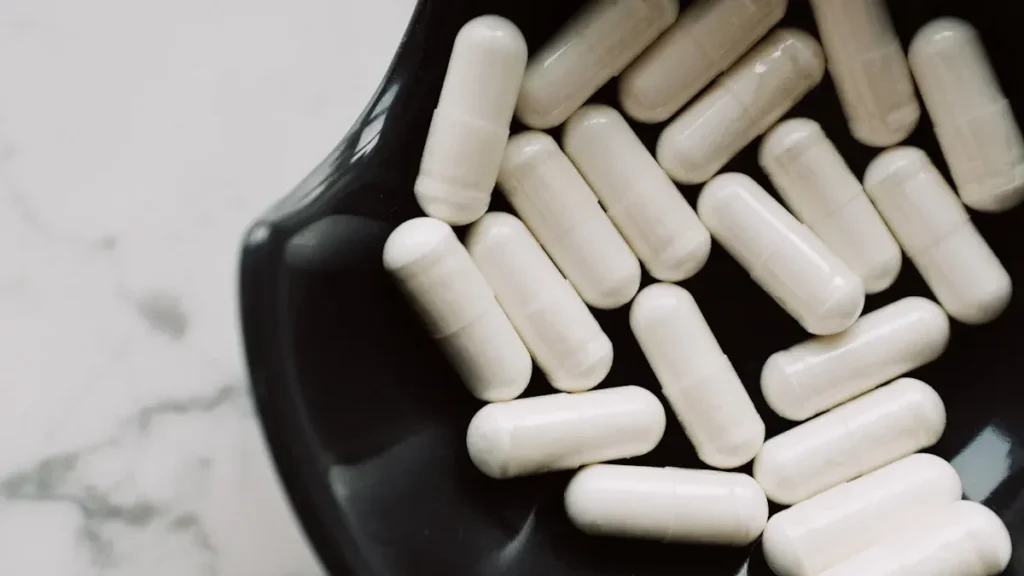Fumaric acid is a strong excipient in many medicines. This compound helps drugs stay good longer. It keeps their pH at the right level. It works as a buffer. Fumaric acid also protects the taste. It makes tablets or capsules more stable. Many scientists pick fumaric acid for this reason. It keeps drugs safe and working for more time. It does not absorb much moisture. This helps keep the quality high.

Fumaric Acid in Pharmaceuticals
What Is an Excipient?
Pharmaceutical excipients are added to medicines but do not treat illness. They help make drugs into tablets or capsules that people can take. Excipients have many jobs in medicines. Some help hold tablets together. Others fill space, help tablets break apart, or keep them from sticking. Some stop germs from growing. Each kind helps make, store, and deliver the drug. Excipients also change how fast a tablet falls apart and how quickly the medicine mixes with water. Scientists now know excipients do more than just fill space. Their features help drugs stay safe, even, and work well.
Excipients make sure medicines have the right look and feel. They help press tablets, stop drugs from breaking down, and make them taste and look better. Groups like the FDA and EMA check excipients to make sure they work and are safe.
Fumaric acid is one kind of excipient. It helps keep pH steady and works as a buffer. It does not take in much water, so it helps drugs last longer.
Why Stability Matters
Stability means a medicine stays safe and works until it expires. Many things can make a drug unstable, like heat, light, water, or air. Changes in pH, how small the pieces are, or the package can also hurt drug quality.
- Things that make drugs less stable:
- High heat makes drugs break down faster.
- Water can cause bad reactions.
- Light, especially UV, can make drugs weaker.
- Air can react with drugs and ruin them.
Fumaric acid helps stop these problems. It keeps pH steady and does not soak up much water, so it helps keep drugs good.
| Aspect | Impact on Pharmaceutical Products |
|---|---|
| Ensures Product Efficacy | The medicine stays strong and works for a long time. |
| Guarantees Safety | Stops bad breakdowns, so people stay safe. |
| Regulatory Compliance | Meets FDA and EMA rules for selling and using the drug. |
| Optimizes Shelf Life & Storage | Helps set the best way to store drugs and how long they last. |
| Supports Product Development | Shows how drugs break down and helps make better medicines. |
Groups like the FDA and EMA say fumaric acid is safe to use. They watch how it is used in medicines you swallow. They update rules to keep drugs safe and high quality. Companies must follow these rules to make good medicines.
Mechanisms of Fumaric Acid
pH Regulation and Buffering
Fumaric acid helps control pH in medicines. It makes the area around the drug a little acidic. This helps stop the medicine from breaking down when pH changes. Scientists found that adding fumaric acid to some drugs, like dipyridamole, helps the drug come out better and more evenly. The medicine can dissolve well in both acid and neutral places. This means people get the same effect, even if their stomach acid is low. The drug stays safe and works like it should.
Fumaric acid is also a buffer. It keeps the pH steady inside the tablet. This helps protect the drug from water and air. The buffer stops the medicine from breaking down too fast. Fumaric acid can make a strong salt with some drugs. This makes the medicine stronger and less likely to fall apart. Its mild acidity keeps things balanced, so the drug does not get too acidic. This pH control helps the medicine last longer and work better.
- Fumaric acid makes a safe place for the drug.
- It stops bad reactions that could hurt the medicine.
- The buffer helps the drug last longer on the shelf.
- Fumaric acid works better than many other acid helpers, especially for heat and light.
Moisture Control
Moisture can ruin medicines by making them break down or stick together. Fumaric acid helps keep moisture away from drugs. It does not soak up much water from the air. This keeps tablets dry and hard while they are stored or shipped. In foods like candy and desserts, fumaric acid also keeps out water. This same feature helps in medicines, where keeping out water is very important for shelf life.
Tip: Fumaric acid in tablets helps stop moisture problems, so the medicine stays fresh and works longer.
By keeping out water, fumaric acid helps keep the medicine safe and good. People get medicine that works right, even after months on the shelf.
Disintegration and Solubility
When someone takes a tablet, it needs to break apart and dissolve fast so the body can use the medicine. Fumaric acid and its related compounds help tablets break up faster. Studies show that tablets with sodium stearyl fumarate break up quicker than those with other ingredients. This means the medicine can start working sooner.
Fumaric acid also helps the drug dissolve better. It can make special mixes with drugs that do not dissolve well. These mixes help the drug dissolve faster and more fully. For example, when mixed with diacerein, fumaric acid helps the drug dissolve and be used by the body. The medicine is easier for the body to use. Fumaric acid is less water-hating than some other tablet ingredients, so it does not slow down how fast the tablet dissolves. This makes it a good choice for medicines that need to work fast.
| Mechanism | How Fumaric Acid Helps |
|---|---|
| pH Regulation | Keeps pH steady, protects drug from damage |
| Buffering | Maintains balance, prevents breakdown |
| Moisture Control | Stops water absorption, extends shelf life |
| Disintegration | Helps tablets break apart faster |
| Solubility | Improves how well the drug dissolves |
Fumaric acid helps keep medicines stable by controlling pH, stopping moisture, and helping tablets dissolve quickly. These things make it a good excipient in today’s medicines.
Benefits of Using Fumaric Acid
Enhanced Stability
Fumaric acid helps medicines stay strong for a long time. Scientists tested berberine chloride with fumaric acid. They made a special cocrystal and checked it with heat and water. The drug stayed strong, even in wet air. The cocrystal dissolved better and lasted longer than other types. Researchers used X-ray tools and computers to see how fumaric acid protects the drug. These tests showed fumaric acid keeps medicine safe and working.
Medicines must stay fresh and work until people use them. Fumaric acid acts like a natural preservative. It stops germs from growing and keeps medicine from breaking down. This excipient also controls acidity, which helps keep color and flavor. Tablets with fumaric acid do not soak up much water. This means they stay hard and do not stick together. Many medicines are more stable because of this.
Fumaric acid helps keep flavor fresh and color bright in tablets and liquids. It makes the taste last longer and keeps it stable.
Efficiency Compared to Other Excipients
Fumaric acid works better than many other acidulants. Citric acid and tartaric acid are common, but fumaric acid is stronger. This means it gives more tartness with less material. Tablets and capsules need less fumaric acid for the same effect. This saves time and resources when making medicine.
| Acidulant | Acidity Strength | Moisture Absorption | Tartness Quality | Efficiency |
|---|---|---|---|---|
| Fumaric Acid | High | Very Low | Intense, long-lasting | High |
| Citric Acid | Moderate | Moderate | Mild | Moderate |
| Tartaric Acid | Moderate | High | Sharp | Low |
Fumaric acid keeps flavor stable in medicines. It helps tablets break apart and dissolve well. This excipient also keeps the product safe while it is stored. Manufacturers check fumaric acid to make sure it is pure and works the same every time. These features help keep medicine’s quality, color, and flavor at their best.
- Fumaric acid helps tablets break apart and dissolve.
- It keeps pH steady in liquid medicines.
- Its low moisture absorption helps medicines last longer.
- Quality checks make sure it works the same every time.
- It acts as a preservative, keeping flavor and color fresh.
Pharmaceutical companies use fumaric acid in many products. They add it to chewable tablets for strong and lasting tartness. Liquid medicines use fumaric acid to keep flavor stable and stop spoilage. Some capsules use fumaric acid to help the drug dissolve faster. These real examples show why fumaric acid is good for modern medicines.
Fumaric acid helps drugs last longer by keeping pH steady. It works as a buffer and keeps out water. Because it does not take in much water, flavor and color stay the same, even after a long time. Experts say picking the right excipient is important for drug quality and safety. Rules from agencies need proof that excipients work well. New drugs use excipients to keep flavor good and help them last longer. Scientists are still finding new ways to use these ingredients to make safer and better medicines.
FAQ
What is the main role of fumaric acid in medicines?
Fumaric acid helps drugs stay good for longer. It keeps the pH level steady. It stops water from hurting tablets. This excipient also helps tablets break up and dissolve quickly.
How does fumaric acid compare to citric acid in drug stability?
Fumaric acid is more acidic than citric acid. It takes in less water than citric acid. It helps drugs last longer. It keeps flavor and color the same.
Can food manufacturers use fumaric acid in their products?
Food makers use fumaric acid to keep food fresh. It helps make snacks and drinks taste better. This acid controls water and flavor in many foods.
Is fumaric acid safe for people to take in medicines?
Groups like the FDA and EMA say fumaric acid is safe. Scientists check it to make sure it does not hurt people.
Why do companies choose fumaric acid over other excipients?
Companies pick fumaric acid because it keeps drugs strong. It controls pH and does not take in much water. It helps medicines last longer and work well.




